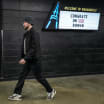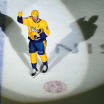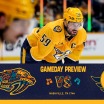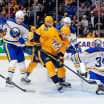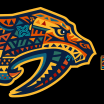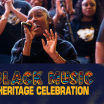A number of banners hang in the rafters of Bridgestone Arena, but only one honors someone other than the hometown Nashville Predators.
Look up, and you'll see a pennant emblazoned with a recognizable "G" logo belonging to one of the greatest entertainers of our time. The banner is accented with the text "9 Shows" and the number 151,677 to represent the total count of patrons through the arena doors back in December of 2010 to see the one and only Garth Brooks take the stage.
Impact From Garth Brooks Concerts Still Felt A Decade Later
Nine Shows Over Six Nights in 2010 Benefited Flood Victims, Made Bridgestone Arena Destination for Top Concerts
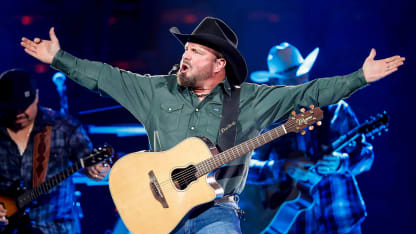
© John Russell
Nine shows over the course of six nights - Dec. 16 to 22, 2010, including doubleheaders on three occasions - would have been a spectacular feat no matter the occasion, but the reason behind the performances resonated with all who bought a ticket for $25 each.
And every penny of the almost $5 million raised from the sales went to those who needed it most.
On May 1, 2010, it began to rain in Nashville and surrounding areas in Middle Tennessee. By the time the skies had cleared, approximately 36 hours later, more than 13 inches of precipitation had fallen throughout the region.
A total of 26 people died from flooding in Tennessee and Kentucky, including 11 in the Nashville area alone. Nearly 10,000 people were displaced from their homes, and nearly 11,000 properties were damaged or destroyed causing more than $2 billion in private property damage and $120 million in public infrastructure damage in Music City.
Bridgestone Arena was not immune to the damage, and the Predators locker room was among the areas resembling a pond by the time the floodwaters reached their peak.
Of course, community members immediately began to offer whatever they could - food, water, shelter and financial support - and that included those in the music industry. In fact, 67 percent of flood response donations came from the music industry, as noted by Community Foundation of Middle Tennessee President Ellen Lehman.
And there was still someone who wanted to help.
"From a distance through all these months, Garth watched as the spring and the summer passed, and he came to recognize how he might be able to help," Lehman said. "He understood that more money wasn't needed despite all of our work for all of this time, and he understood that people were depressed and they were worn out and they were exhausted - and it was still a land of misery.
"At that point, Garth had decided that we, as the Community Foundation, and as the recipients of all the money that had come in, and then was going out to fix our community, had done our part."
Plans were made, and in September of 2010, a press conference was held to announce Brooks, the top-selling solo artist of all time, would play a show at Bridgestone Arena that December to benefit flood victims. Then, the tickets went on sale - and they just kept selling.
"I'd never been part of a Garth Brooks sale on a professional level, but I remembered in college when he would go on sale and they'd announce one show and add another, add another, add another and that's how we went," Predators and Bridgestone Arena Senior Vice President of Entertainment and Marketing David Kells said. "We didn't know if we were doing one show or two shows, maybe three - we wound up doing nine shows."
"It was an incredibly generous thing for Garth Brooks to do with his entire organization," former Nashville Mayor Karl Dean said. "To me, the timing of it occurring in the six months after the flood was notable. There had been a lot of contributions and generosity in the days and weeks after the flood, but there was still a lot of work to do. For him to do that at that point, that meant a lot to the recovery process. And it was sort of unprecedented that someone was giving these concerts and doing it over a period of six nights. To do nine shows in six nights yeah, just an incredible effort."
The timing of it all wasn't lost on anyone involved, including Brooks himself, who made it a point to find a way to benefit as many as he could given the circumstances. The flood victims were top of mind, but so many of those victims also worked in the hospitality industry.
Brooks and his team knew those weeks leading up to Christmas were traditionally slower times for hotels, restaurants and the like downtown. Putting on a slew of shows at that time of the year would provide a boost to those around the holidays who could certainly use one, so that's what he did.
"I remember someone said, 'Why in December? The need is now,'" Predators and Bridgestone Arena President and CEO Sean Henry recalled. "And what [Brooks] said hit me hard, and I think it hit a lot of people that try to make a difference in people's lives financially and with their time. But he said, 'Come around Christmastime, a lot of the victims are going to be forgotten, because it's going to be six or seven months later, and the floods are going to be in the back of everyone's mind… This isn't just about keeping the flood victims front of mind… I want to positively affect a struggling industry. That's the hospitality industry where so many were victims of the flood and make it one of the busiest weeks they've ever enjoyed at work.'"
That mentality stuck with Henry, and it mattered to Brooks's longtime promoter, Ben Farrell, too. Farrell knows Brooks better than most, so he's well aware the country-music superstar is about as humble as they come.
Farrell has also been around long enough to know that a benefit concert doesn't always provide the greatest benefit to those in need. But 10 years later - and after a whole lot more spent in the industry - Farrell says the string of concerts is something he'll never forget.
"The most heartwarming part of it was everything was done on the up and up," Farrell said. "There wasn't any money made out of it, and everything went to the benefit. It wasn't like somebody's taken off on a big percentage of this and the benefit got the rest of money, one of those deals. I can absolutely, personally attest that 100 percent of every available dollar went to the benefit, and that's really - it's almost historic… It was extremely special. It has to be right up there toward the top of anything we've done, frankly."
The funds raised and impacts made were monumental, but why raise a banner? Ultimately, doing so was a no-brainer.
Brooks's generosity over those six nights alone deserved some sort of permanent honor, but those nine consecutive shows did as much for Bridgestone Arena and the franchise as any artist has ever done.
"We were a building that you didn't have to play if you were a major tour back then," Henry said. "When you did play, you played one show and you're gone, and we were really struggling to get people to play multiple dates… But by putting that first show up on sale and rolling to a second or third or fourth or fifth or six, all the way through nine, we were all just blown away by it. It truly woke up this great industry that we enjoy and shined the light on Bridgestone Arena and Nashville, that this is the best place to come into work.
"We needed to honor what he did in the most public fashion in the world. And because he did as much for our franchise as any other person, and I make that crossover intentionally, because being a busy concert venue makes the team better, and being a good team makes the concert business better in our building. He's the one who did it, so who better to have hanging from a rafter than a man that tangibly did so many incredible things for the Nashville Predators and Bridgestone Arena."
Music is powerful, and it's capable of transforming lives in ways never thought possible. From the very first stroke of the guitar to the final note of the final night of the nine shows 10 years ago, Brooks did something only he could do.
And that $5 million donation was so much more than a number.
"Garth did something that I don't think anyone else could have done, or would have thought to do, and that is having affordable and available tickets for nine shows was astounding," Lehman said. "He brought people happiness and joy, right at the Christmas season, after months of agony. He brought kindness, and he brought joy to those who were depressed and worn out… We often say that we at the Community Foundation of Middle Tennessee work to connect generosity with need. Never again will I ever have the privilege to be part of such generosity and making so many hearts happy."
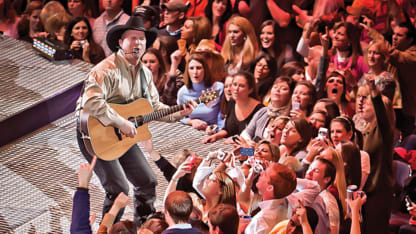
© Nashville Predators
You may not think about those concerts much - perhaps you've never even noticed the banner at all - but when we're all able to gather again at Bridgestone Arena, take a look upward for just a moment and pay tribute to a man who did so much just by singing a few tunes.
"We look at some signposts of history for the arena and for the franchise, and hosting the 2016 NHL All-Star Game, making the Stanley Cup Final, and for Nashville as a concert destination, for Nashville tourism and for Bridgestone Arena, those nine shows are right up there," Kells said. "They showed that we could sell nine shows, whereas maybe people didn't have the confidence of what Nashville could sell as a city. And when you see you can put those big numbers up; more people are going to follow that. More people are going to see the success that we're able to have, and that was one of those moments that helped raise our flag."
"It was just a huge shot in the arm for the city," Dean said. "We just never had anything like this, multiple shows night after night from one of the greatest stars in America, and people responded. It was very much a positive thing for the city. Garth Brooks is obviously a very generous man, but he's also a very smart man. And I think he thought through how he wanted to do this, and he executed it perfectly."

